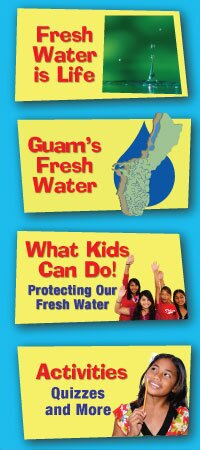Teachers' Educational Materials
INTRODUCTION
WERI: The Water and Environmental Research Institute of the Western Pacific with funding assistance from the U.S. Geological Survey has granted funds to create these educational materials as part of a public outreach program for children age 9-12.
The "Guam Water Kids" project focuses on three main ideas: the value of fresh water as one of Guam's most important natural resources; how our supply of fresh water is renewed by the Water Cycle; and what youth can do to take responsibility for avoiding the pollution and waste of the island's fresh water supply.
In addition to the Teachers' Materials herein and this interactive website, a narrated slideshow suitable for classroom presentation is also availabled by download below or by FloraFox, Regina.
MATERIALS FOR TEACHERS:
[Primary Subject: Science. Secondary Subjects: Art, Language Arts, Social Studies, Chamorro Studies, Spelling Vocabulary. Grade Level: 3-7.]
LESSON 1: "The Water Cycle and Guam's Fresh Water" [with Word Bank and Activities]
Lesson Plan 1 (.pdf)
Water Cycle Labeling Activity (.pdf)
LESSON 2: "Pollution and Conservation of Guam's Fresh Water" [with Word Bank and Activities]
Lesson Plan 2 (.pdf)
GUAM WATER KIDS SLIDESHOW
Presentation format compatible with PowerPoint 98 through PowerPoint 2004 for Mac and PowerPoint 97 through PowerPoint 2003 for Windows. Requires Quicktime.
Guam Water Kids Slideshow (Mac & Windows) .ppt file 140.6MB
Apple QuickTime player download: http://www.apple.com/quicktime/download
CHAMORRO GLOSSARY
Terms Related to Fresh Water (.pdf)
Continuing Education Classes emphasizing "action learning" and Guam's fresh water resources.
Completed Fall 2012:
Teaching Teachers about Guam's Fresh Water and Guam Water Kids
Course Syllabus (.pdf)
Handout: For Main Assignment (.pdf)
Tentatively Scheduled Fall 2013:
Teaching Teachers about Guam's Fresh Water and Guam Water Kids (Expanded to 3 hrs)
NOTE: These downloadable materials are provided free for use in helping students understand the connections between the source of the fresh water they use everyday and the ways their own personal habits affect the environment and human health. You will need Adobe Acrobat Reader or Apple QuickTime Player to view some of the files on this page.
